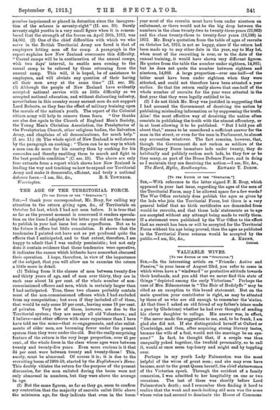THE AGE OF THE TERRITORIAL FORCE. [TO THE EDITOR 01/
THE " SPECTATOR. 'l
SIR,—I thank your correspondent, Mr. Bray, for calling my attention to the return giving ages, &c., of Territorials on October 1st last., which I had not seen before. It is true that as far as the present moment is concerned it renders specula- tion on the lines I adopted in the letter you did me the honour to publish in your last issue but one superfluous. But as to the future it offers but little consolation. It shows that the tendencies I pointed out have not as yet produced quite the effects that I anticipated, and to that extent, therefore, I am happy to admit that I was unduly pessimistic ; but not only does it contain evidence that those tendencies were operative, it indicates the causes which hitherto have somewhat obscured their operation. I hope, therefore, in view of the importance of the subject, that you will allow me to examine the return a little more in detail.
(1) Taking from it the classes of men between twenty-five and thirty years of age, and of men over thirty, they are in each case about 14 per cent. of the whole number of non- commissioned officers and men, which is certainly larger than I had anticipated. True, these two classes probably contain most of the non-commissioned officers which I had excluded from my computation; but even if they included all of them, that would be only some 10 per cent., leaving some 18 per cent. of privates. Very few of these, however, are due to the Territorial system ; they are nearly all old Volunteers ; and I believe—and other officers with more experience than I have have told me the same—that re-engagements, and also enlist- ments of older men, are becoming fewer under the present system than they were under the old. But the really surprising feature of the return is the very large proportion, over 45 per cent., of the whole force in the class whose ages were between twenty and twenty-five years. Even more curious is it that 34 per cent. were between twenty and twenty-three ! This, surely, must be abnormal. Of course it is ; it is due to the recruiting boom of 1909.10, started by the Englishman's Home. This doubly vitiates the return for the purpose of the present discussion, for the men enlisted during the boom were not only abnormal in numbers, but they were above the average in age.
(2) But the same figures, as far as they go, seem to confirm my contention_ that the majority of recruits enlist little above the minimum age, for they indicate that even in the boom year most of the recruits must have been under nineteen on enlistment, or there would not be the big drop between the numbers in the class twenty-two to twenty-three years (22,063) and the class twenty-three to twenty-four years (16,188) in 1912. Mr. Bray's quotation from the table of ages of recruits on October 1st, 1912, is not so happy, since if the return had been made up to any other date in the year, say to May 1st, when most of the recruiting is over, or to the date of the annual training, it would have shown very different figures. He quotes from the table the number under eighteen, 14,982; but be does not quote the number between eighteen and nineteen, 14,9S8. A large proportion—over one-half—of the latter must have been under eighteen when they were attested, and could not therefore have been attested a year earlier. So that the return really shows that one-half of the whole number of recruits for the year were attested in the first year that they were legally entitled to be.
(3) I do not think Mr. Bray was justified in suggesting that I had accused the Government of deceiving the nation by publishing misleading information or by suppressing the truth. Alas ! the most effective way of deceiving the nation often consists in publishing the truth with the utmost effrontery, or in at least allowing it to be published. " But I told you all about that," seems to be considered a sufficient answer for the man in the street, or even for the man in Parliament, to almost any accusation whatever. The fact remains, however, that though the Government do not reckon as soldiers of the Expeditionary Force immature lads under twenty, they do habitually and publicly reckon such lads, be they few or be they many, as part of the Home Defence Force, and in doing so I maintain they are deceiving the nation.—I am, Sir, &c.,
The Hard, Hythe, Southampton. EDWARD T. DIXON.






































 Previous page
Previous page